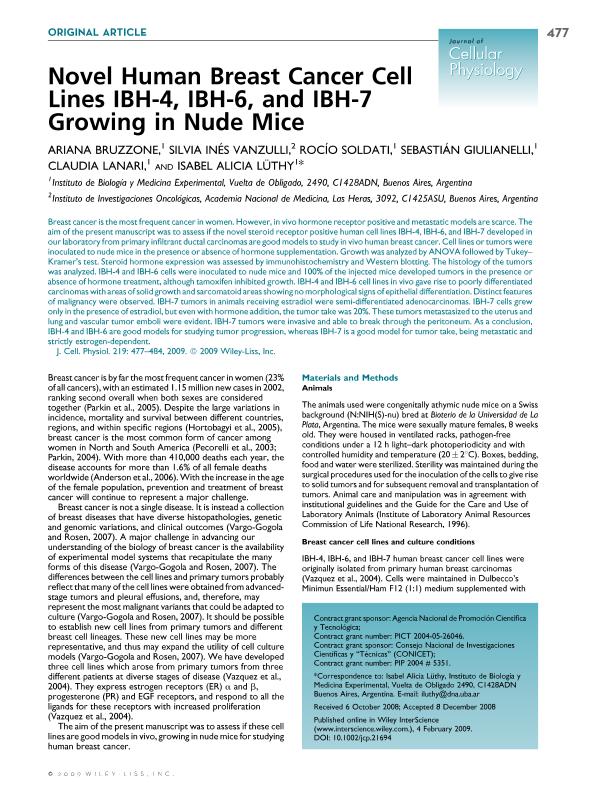Artículo
Novel human breast cancer cell lines IBH-4, IBH-6, and IBH-7 growing in nude mice
Bruzzone, Ariana ; Vanzulli, Silvia; Soldati, Rocío Cinthia; Giulianelli, Sebastian Jesus
; Vanzulli, Silvia; Soldati, Rocío Cinthia; Giulianelli, Sebastian Jesus ; Lanari, Claudia Lee Malvina
; Lanari, Claudia Lee Malvina ; Luthy, Isabel Alicia
; Luthy, Isabel Alicia
 ; Vanzulli, Silvia; Soldati, Rocío Cinthia; Giulianelli, Sebastian Jesus
; Vanzulli, Silvia; Soldati, Rocío Cinthia; Giulianelli, Sebastian Jesus ; Lanari, Claudia Lee Malvina
; Lanari, Claudia Lee Malvina ; Luthy, Isabel Alicia
; Luthy, Isabel Alicia
Fecha de publicación:
02/2009
Editorial:
Wiley
Revista:
Journal of Cellular Physiology
ISSN:
0021-9541
e-ISSN:
1097-4652
Idioma:
Inglés
Tipo de recurso:
Artículo publicado
Clasificación temática:
Resumen
Breast cancer is the most frequent cancer in women. However, in vivo hormone receptor positive and metastatic models are scarce. The aim of the present manuscript was to assess if the novel steroid receptor positive human cell lines IBH-4, IBH-6 and IBH-7 developed in our laboratory from primary infiltrant ductal carcinomas are good models to study in vivo human breast cancer. Cell lines or tumors were inoculated to nude mice in the presence or absence of hormone supplementation. Growth was analyzed by ANOVA followed by Tukey-Kramer´s test. Steroid hormone expression was assessed by confocal immunofluorescence and Western blotting. The histology of the tumors was analyzed. IBH-4 and IBH-6 cells were inoculated to nude mice and 100% of the injected mice developed tumors in the presence or absence of hormone treatment, although tamoxifen inhibited growth. IBH-4 and IBH-6 cell lines in vivo gave rise to poorly differentiated carcinomas with areas of solid growth and sarcomatoid areas showing no morphological signs of epithelial differentiation. Distinct features of malignancy were observed. IBH-7 tumors in animals receiving estradiol were semi-differentiated adenocarcinomas. IBH-7 cells grew only in the presence of estradiol, but even with hormone addition, the tumor take was 20%. These tumors metastasized to the uterus and lung and vascular tumor emboli were evident. IBH-7 tumors were invasive and able to break through the peritoneum. As a conclusion, IBH-4 and IBH-6 are good models for studying tumor progression, whereas IBH-7 is a good model for tumor take, being metastatic and strictly estrogen-dependent.
Palabras clave:
Breast Cancer
,
Human Cell Lines
,
Hormone Receptors
Archivos asociados
Licencia
Identificadores
Colecciones
Articulos(IBYME)
Articulos de INST.DE BIOLOGIA Y MEDICINA EXPERIMENTAL (I)
Articulos de INST.DE BIOLOGIA Y MEDICINA EXPERIMENTAL (I)
Citación
Bruzzone, Ariana; Vanzulli, Silvia; Soldati, Rocío Cinthia; Giulianelli, Sebastian Jesus; Lanari, Claudia Lee Malvina; et al.; Novel human breast cancer cell lines IBH-4, IBH-6, and IBH-7 growing in nude mice; Wiley; Journal of Cellular Physiology; 219; 2; 2-2009; 477-484
Compartir
Altmétricas



